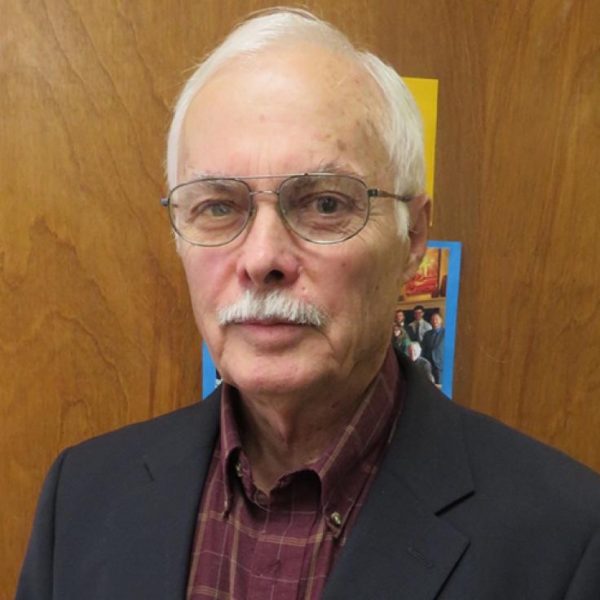
After over four decades on the faculty in the CSU Department of Political Science, Dr. Stephen Mumme will be retiring at the end of the 2024 spring semester. Mumme spent his career specializing in comparative government with a focus on environmental politics and policy— with a research focus that has centered on water management and environmental politics along the U.S.-Mexico border. Steve has authored or co-authored several monographs and more than 150 journal articles and chapters. He is best known as a leading authority on the work of the International Boundary and Water Commission, United States and Mexico and the landmark 1944 Water Treaty that governs transboundary water management. Mumme leaves behind a rich legacy of research and teaching that has elevated the Department of Political Science.
How did your interest in water policy begin?
My fundamental interest has always been understanding Mexican government and Mexico’s relationship with the U.S. I had planned to write a dissertation on Mexican immigration to the U.S.—an extension of my M.A. thesis on Mexican population policy. But my dissertation supervisor thought too many dissertations were being written at the time on aspects of the immigration situation and asked me to propose another topic. I was aware that the Colorado River had become controversial in the preceding decade and noticed that several international lawyers were proposing that the two countries reach a bilateral agreement on groundwater. The political impediments to such a treaty were formidable and I thought I could bring a political science and policy perspective to that discussion. My dissertation on groundwater management along the boundary required an in-depth immersion in international water law and domestic water policy (Mexico and U.S.) more generally and that paved the way for an enduring interest in binational water and environmental affairs.
What was your first year like at CSU?
Interesting. I was hired to teach Latin American Politics and contribute to the new Ph.D. program focused on the environment and natural resources. At the time (1983) there were very few political science doctoral programs focused heavily on environmental topics and none that had the obligatory environmental dissertation mandate we have. Few political science faculty members nationwide writing on the environment were trained in the field of environmental policy or politics. These programs were in their infancy, as was ours. So, there was much to do figuring out how to develop our new doctoral program on the environment—Jessica Kozloff, our first doctoral/environment student (who became president of Bloomberg College in Pennsylvania), had just graduated when I arrived. The program was so young that some tenured faculty members were still opposed to the program, preferring the department take a more general heading with its graduate programs. Most senior faculty and John Straayer, department chair, were on board and highly supportive. But it was clear there were some lingering tensions when I arrived. So, as I said, it was an interesting time to join the department.
How did your expertise evolve during your tenure?
My dissertation work brought me into contact with a number of prominent water scholars from various disciplines early in my career and I was lucky to have some good mentors that made a number of research opportunities available. Early in my career I continued to focus on Mexico’s internal environmental politics and to this day I continue to follow those developments. But shortly after completing my dissertation Mexico and the U.S. signed an environmental cooperation agreement and I knew several of the international lawyers that influenced the agreement. So, it was an opportunity to broaden my focus to consider a gamut of environmental concerns confronting both countries along the boundary. I knew that environmental issues would only grow in importance as the rapidly industrializing border region generated serious challenges that could only be met by greater binational cooperation on environmental protection. These concerns intersected in various ways with water management. So, as research interests often do, one project leads to another and to varied opportunities to build on what you’ve learned. I benefitted from the fact that in the 80’s and 90’s only a handful of scholars from various disciplines paid attention to border water and environmental matters. That is no longer true, and I’m proud to have paved the way for a larger group of emerging scholars from different disciplines who are interested in these problems. These are inherently interdisciplinary issues.
What have you appreciated about CSU as your career home?
Three things come to mind. First, the department and the university from the time I arrived developed a solid framework for supporting environmental research that encouraged both disciplinary and interdisciplinary scholarship. This only strengthened over time (think SOGES). I always felt supported and was rarely second-guessed by colleagues as I pursued my research agenda. Second, I was privileged to play a part in designing our department code in the late 1980’s (yes, it dates back that far) which by design established a system that supported faculty disciplinary and interdisciplinary effort, advanced environmental studies while equally valuing faculty who were not focused on environmental affairs, and established a decision-making system in which all faculty have a meaningful voice in department affairs. Third, and most personally rewarding, is seeing one’s students go on to rewarding careers. To take just one example from early in my career, I am proud to have encouraged Dr. Jeni Cross (Sociology) to pursue her doctoral degree, which she did at UC Davis, returning to CSU to make a distinguished career in the CSU sociology department. It doesn’t get better than that.
What are you most looking forward to as you transition into retirement?
Continuing to research and follow border water and environmental affairs working with Rice University’s Mexico Center, working with the Colorado AAUP, seeing daughters a little more often, spending a little more time in Arizona closer to extended family, and having more time for discretionary travel with friends and family. Definitely not Golf.
Political Science colleagues reflect on Mumme’s impact:
“Steve Mumme is an extraordinary political scientist, Latin Americanist and Mexico specialist. He is a prolific writer and researcher whose contributions to our field are immense. His work has helped advance the study of borders and environmental politics. He has been a generous mentor to many people in our discipline, including myself. His selfless dedication to building strong academic institutions that protect faculty governance and academic freedom is one of his most important legacies. Here, I would like to commend his dedication to the AAUP in defending the rights of academic workers. Steve’s extraordinary life, from his childhood in Bolivia to his experience in Vietnam, and more, has produced a genuinely interesting and generous person, knowledgeable about the human condition in general, and politics in particular. He has touched my career, advised me well, and opened doors. I am honored to know him and count myself as one of his colleagues.” – Prof. Marcela Velasco
“Steve has been a true steward of the department, and his impact goes far beyond Political Science. There are countless ways in which he has made CSU a more hospitable and just working environment. Steve has never been a self-promotor, so many of these actions aren’t widely known or appreciated, but everyone in the department and the college of liberal arts owes Steve a debt of gratitude. In addition, Steve is also a scholar’s scholar; his dedication to the craft and vocation of scholarship has been a shining example of what is possible in academia. In short, Steve has been an amazing colleague and role model. His steady presence will be deeply missed.” – Prof. David McIvor
“I have known Steve since I started here in 2018. As a new assistant professor, there were a lot of things I asked for his advice on, especially on student advising and mentoring, and he was always willing to talk and invest time and energy in my progress. He has not only been a supportive colleague but a great mentor. I have several students in my capstone class who have developed their capstone projects from what they have learned and written for Steve’s courses, especially the POLS 331 course. The students always speak very enthusiastically about that course. His dedication to students has made a huge difference in my journey of advising students. I would like to take this opportunity to thank Steve for his generous support over the past few years.” – Prof. Julia Lee
“I want to share my gratitude for Steve’s service and contributions in the department and university, and my immense respect for his dedication to research and teaching that has elevated the Department of Political Science.” – Prof. Robert Duffy, Department Chair
